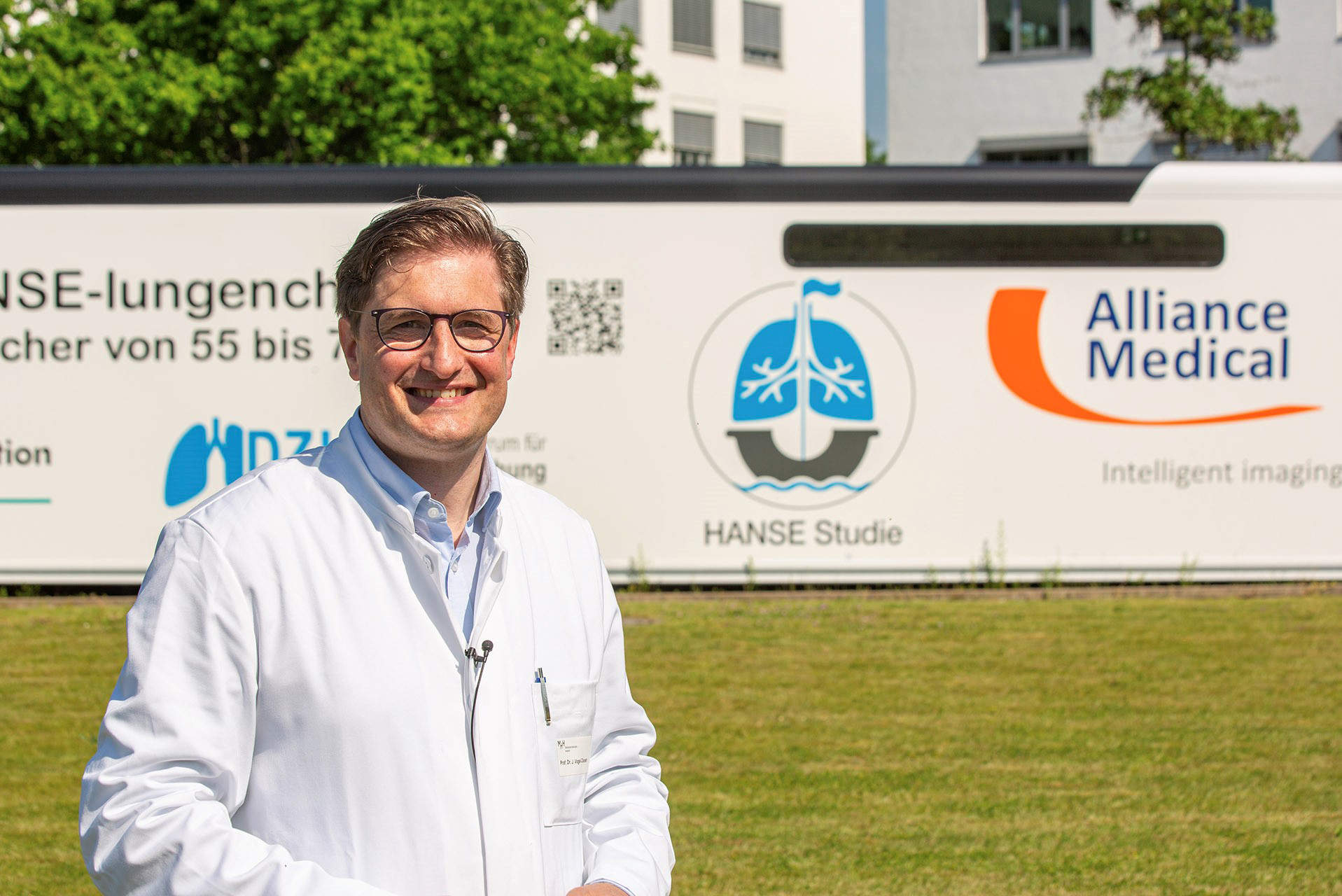MHH involved in HANSE screening programme for former and active smokers

Professor Jens Vogel-Claussen, scientific director of the HANSE study, in front of the study truck; Copyright: Stefan Knaak Photography.
17.06.2021
On 26 July, the largest German programme to date for the early detection of lung cancer starts with over 12,000 test persons. Three lung centres in northern Germany and the prominent physician and patron of the study, Dr. Eckart von Hirschhausen, invite women and men between 55 and 79 years of age to take part in a free lung check. The target group is (ex-)smokers who have an increased risk of lung cancer. Up to 5,000 people will receive a free examination with a modern low-dose computed tomography (CT) in a mobile study truck that will alternate between the three study sites in Hanover, Lübeck and Großhansdorf near Hamburg.
The HANSE screening programme is being conducted under the direction of Professor Dr. Jens Vogel-Claussen (Hannover Medical School), Dr. Sabine Bohnet (UKSH Campus Lübeck) and Professor Dr. Martin Reck (LungenClinic Großhansdorf). All three institutions are members of the German Centre for Lung Research. At the MHH, the Institute for Diagnostic and Interventional Radiology and the Department of Pneumology are involved. The head of the study is the radiologist Professor Vogel-Claussen, and senior physician Dr Benjamin-Alexander Bollmann from the Department of Pneumology is significantly involved.
The Hanse study will run until summer 2023. During this time, 350,000 people in the metropolitan area are to be contacted for participation. Registration for the free lung check is already possible online at www.hanse-lungencheck.de.
Early lung cancer detection in Germany
Lung cancer often causes no symptoms in its early stages and is often only diagnosed at an advanced or metastasised stage, which worsens the prospects of cure. It is the second most common cause of cancer-related death in women and the most common in men. However, studies now show that low-dose CT can detect lung tumours early and thus reduce lung cancer mortality. "With our HANSE Lung Check as a pilot study, we want to prove that a holistic and effective lung cancer screening programme can be implemented in Germany within the structures of the German healthcare system for high-risk patients," says Professor Dr Jens Vogel-Claussen, scientific director of the study and principal investigator at MHH. In all likelihood, there will be a national programme for lung cancer screening for the first time from 2023.
The individual risk profile is decisive
In the HANSE screening programme, the feasibility and effectiveness of a model-based versus a conventional risk assessment for lung cancer is being tested. Since people with an increased risk of lung cancer in particular benefit from a screening programme, the individual risk profile must be determined before participation. Interested persons can have this calculated on the HANSE study website. "Only if there is an increased risk people are invited to low-dose CT. This is very crucial, because it is the only way we can ensure that the benefits of the examination outweigh the risks" says Prof. Vogel-Claussen. "But of course we also need the low-risk subjects to find out if you have developed lung cancer despite being at low risk."
Interdisciplinary cooperation
An interdisciplinary team of radiology and pneumology carries out the lung check. A CT technology is used that uses a particularly low radiation dose and is only about one tenth of the average annual natural radiation in Germany. With this gentle imaging procedure, the test persons receive detailed information regarding any lung cancer that may be present and can then receive medical care in the certified cancer centres. At the same time, they are examined for possible other lung or cardiovascular diseases such as emphysema of the lung or arteriosclerosis. Artificial intelligence-based software provides support in the evaluation. The comprehensive findings are then also sent to the respective general practitioners and specialists. In addition to the CT, the participants are offered a smoking cessation programme. "The best prevention is still to stop smoking," emphasises Professor Vogel-Claussen. Professional smoking cessation programmes at the three study sites offer support here.
The study is supported and funded by the German Centre for Lung Research (DZL) as well as by the pharmaceutical company AstraZeneca within the framework of the Lung Ambition Alliance, a partnership between industry and science.
SERVICE:
For more information, please contact Professor Dr Jens Vogel-Claussen, scientific director of the HANSE study, Vogel-Claussen.Jens@mh-hannover.de, www.hanse-lungencheck.de